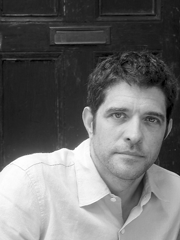Brad Gooch and Donna Minkowitz talk about the challenge gay life poses to religion
The last day of August in Manhattan offered that oddly Biblical sort of weather—intense storms deluging the city in the wake of an unbearable heat wave—appropriate to a conversation with two gay and lesbian writers who have explored religion and spirituality in the context of their own queer lives.
Brad Gooch, who published “Godtalk: Travels in Spiritual America,” in 2002, and Donna Minkowitz, who earlier, in 1998, had written “Ferocious Romance: What My Encounters with the Right Taught Me about Sex, God, and Fury,” sat down that day with Gay City News to discuss a range of issues that their books and the research behind raised—including sex, spirituality, religion, and even S & M.
The two writers, in defining the scope of their books, had set out on similar journeys and in some ways addressed common themes. But Minkowitz and Gooch were aiming to answer very different questions. Minkowitz, in her years as a Village Voice reporter, had developed a reputation as an intrepid, even confrontational journalist. She brought those skills to an examination of what most people in the lesbian and gay community view as the enemy—right-wing Christian evangelicals. It was nothing less than moxie that armed her for the costuming and role-playing that was necessary to her odyssey. She went undercover as a teenage boy to gain entry to all-male Promise Keepers events and masqueraded as a devout Christian woman to participate in Christian Makeover meetings. Yet, in her travels, she discovered a narrative that helped her to explore both sexual and spiritual healing.
Gooch started his research by interviewing Deepak Chopra, visiting Trappist monks, getting to know active members of Promise Keepers, and attending regular prayer services at mosques all over New York City.
“I was starting my book in 1995 and you talked about any of these groups and people’s faces went blank,” Gooch recalled. “Then I would go out of Manhattan and I met all of these other people and they were already there, already heated up about the subject.”
If Gooch experienced indifference in the reactions of friends to his investigations, Minkowitz encountered incredulity and anxiety when she talked about going underground among evangelical Christians.

“The negative political force of the religious right was assumed to be frightening,” she recalled. “However, if I talked about being religious here [in New York] at a party, people looked at me funny.”
Gooch and Minkowitz repeatedly touched on an irony that both encountered in their work—the fact that their sexual orientation and identity challenged established religious thinking but were also informed by their individual search for spiritual connection.
Gooch noted that two of the greatest growth segments on the Internet are those dealing with theology and sex, and chuckled as he observed that in some cases the two overlap, as on those sites where Christian men are seeking subservient Christian women.
“They have taken the whole S & M thing and baptized it,” he said. “American Fundamentalism meets S & M and makes something new.”
Gooch elaborated on this theme in explaining his interpretation of what he witnessed at Promise Keeper events.
“I was at two of their events,” he said. “Sexuality was a part of it, they all had to repent and then suddenly these guys were weeping when they got to the part about being faithful to your wife. It all came out; sexual fidelity became a big issue. Besides the fetishistic thing, you have this kind of talk with them—His Pain, Your Gain, and then there were the Motorcycle Riders for Christ. All of this imagery is right out of the gay bar experience. We moved right into sexuality, but in terms of the way gays discuss monogamy and fidelity.”

Minkowitz confirmed that eroticism was an important component of some of the religious experiences that she observed and in which she participated. In her book, she discussed S & M as a necessary adjunct to her sexual awakening; pain, she explained, can be a safety valve leading one out of a certain loss of feeling.
Other experiences informed Minkowitz’s view of her gender expression. She pointed specifically to the identification she felt with the Promise Keepers.
“I had a lot of trouble expressing emotion and certain other classic male problems,” she explained. “In some ways, butchness was hemming me in the way male strictures were hemming men in.”
Minkowitz also talked about the feminine eroticism she encountered at some Christian-right events. Describing her experiences with the Total Woman Ministries, she recalled, “One hundred women, racially mixed, varying ages, who were all getting dramatic makeovers in order to be re-styled for the Lord [and] were all admiring each other. Some of the language itself, ‘Ain’t no one doing it like Jesus’ became like we were saying, ‘We are women here together speaking the word of the Lord.’ Boy, it was intense.”
Minkowitz also recalled an undeniable element of eroticism in Pentecostal services that she attended.

gaycitynews.com
































